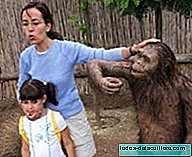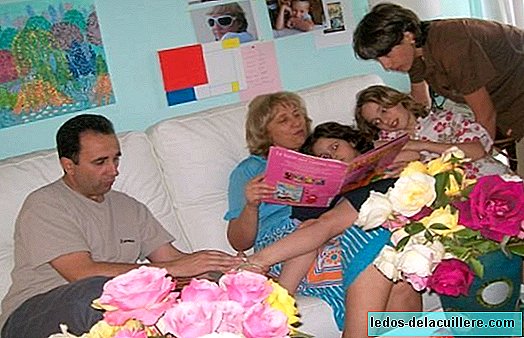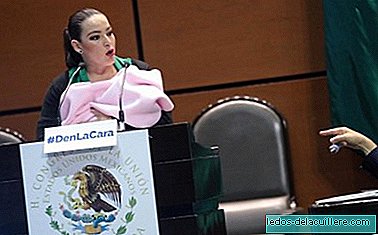
Today we bring you an interesting interview to Ruth gurd, Director of British Nursery, with whom we have talked about bilingualism in young children.
British Nursery has been established 16 years ago in Pozuelo (Madrid) and has been the first authorized British nursery in Spain for children from 1 to 6 years.
Ruth has been working for more than ten years in the field of Early Childhood Education with experience in China, Hong Kong and Chile, as well as in her native England. He fervently believes in the importance of encouraging children to function in English from an early age and works to create an environment where they can develop with a solid foundation in the language. But above all, it promotes the importance of acquiring the values that make children consistent and prepared for the future.
Why is it important for children to learn English (or a second language) from a young age? Is there an age to start learning another language??
Children are like sponges, they have their greatest ability to learn from an early age. By introducing a second language in the first years of a child's life, his will and learning capacity are maximized. When we learn a language as an adult, we translate from the mother tongue to the new language, instead when learning from children, language and phrases are absorbed in the same way as we do in our mother tongue. It is language acquisition, not translation. In addition, the sooner we learn a language, the easier it is to adopt the native accent. If we acquire a second language as a child it is more likely to pronounce the words and speak the language as if we were a native speaker.
There are parents who believe that teaching them another language when they start speaking is detrimental to language acquisition, which can confuse them. Is that so? Why?
The introduction of a second language from birth is natural. It is not to introduce it suddenly, one day, without reason or explanation. It is not prejudicial to provide a child with different linguistic options if a quality exposure to the second language is offered with consistency, with good linguistic immersion bases.
Many children have one or both parents who speak another language, should they speak at home all the time in another language, even from the womb?
Children acquire language long before they start talking. The sooner they start listening to the second language they are going to enter, the better. Therefore, talking with your child even since he is in the womb is very beneficial. When it comes to the introduction of a second language, naturally, the sooner the better.
Some parents are obsessed with children learning many languages (sometimes two or three) and sometimes they do not end up speaking one or the other correctly, they even end up with speech therapists, what do you think of this? Do you think they can learn several languages?
When it comes to the introduction of language in children, quality is key. If you can guarantee a high quality of the language you want to enter, there should be no reluctance to do so. We have several children in British Nursery with transnational families that are introducing their children to three languages. It is possible that the age at which they begin to speak may be delayed, but if the quality is high, when they begin to form complete sentences they will do so completely fluently.
How to make children interested in English? How can school learning be reinforced at home?
The trick for children to be interested in English is not by force, nor as mere academic learning. It must be as natural as possible. Some parents are "desperate" because their children speak English perfectly, but do not force them. To encourage the practice of English at home it is very convenient to play nursery rhymes and nursery rhymes for babies (nyrsery rhymes), even for babies still in the womb. Dialogue in a simple way. Ask him in English how his day has been. Do not force him to respond or be discouraged if he answers in Spanish. The child should feel involved in exposure to the tongue. If you force it, you will be met with resistance. If your child makes mistakes when he speaks English, try to find a gentle way to correct it, not just tell him what he should have said. It is important to encourage it and focus on fluency rather than accuracy at an early age. Find the English version of the cartoons with which you are familiar in Spanish. When you hear the melody sound, you will be motivated. If you are playing with something, play with him and speak to him in English, this way you will see it as something natural and normal. If parents do not speak English or feel uncomfortable doing so, try to go to a nursery or school with native teachers to make sure they are exposed to good English and then at home reinforce with storybooks and cartoon CDs in English. A good trick is a CD with stories to listen to in the car, which keeps children calm on long trips and does not even recognize that it is a different language. There are many available on Amazon, The Gruffalo and Roald Dahl are good starting points.
What method do you use in British Nursery to teach English? I have seen that you give a lot of importance to the participation of the family, as well as to activities such as music, plastic expression ...
In British Nursery we have the philosophy that we are helping to create great minds. Our staff is composed of qualified native-speaking native speakers in the field of children's education, and we follow the "Early Years Foundation Stage" British education system so that our children become bilingual and bicultural. The keys we promote in British Nursery from a British and Multicultural are: • Personal, social and emotional development • Knowledge and understanding of the world • Creative development • Problem solving, reasoning and calculation • Physical development • Communication, Language and literacy All this learning is based on the solid foundation of the British educational project. All activities are carried out in English and all learning is understood through the eyes of our children. We believe that the best possible education for our children is to work side by side with each of our families. We encourage parents to come to school with regular events and extra-curricular learning.
It is often heard that in Spain little and bad English is spoken. How do you see, in broad strokes, the teaching of English in the cabbages of Spain? Are our children being prepared with a good level for the future?
Spaniards speak English much better than English speaks Spanish. You shouldn't be so hard on yourself! However, English in Spain is "taught", and this is the problem. To be really bilingual, a language has to be part of us, not think of a language and then transfer it to another. The child does not learn a language with words, he learns it with everyday phrases and exposure to it through daily immersion. By making the English language a relevant base of our education system from an early age and encouraging children to see the world with bilingual eyes, we will begin to improve the level of English in this country.
I take this opportunity to thank Ruth Gurd, Director of British Nursery, who agreed to answer my questions. Although we have had our ideas and returns with the Spanish translation, the bilingualism in children It is a topic that interests parents who want to introduce a second language to their children.












